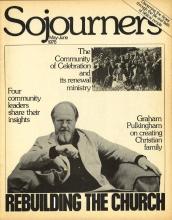The people who were sitting in darkness saw a great light,
And to those who were sitting in the land and the shadow of death
Upon them a light dawned.
From that time Jesus began to preach and say, "Repent; for the kingdom of heaven is at hand" (Matthew 4:16-17).
At the outset of his ministry, just following his temptation in the wilderness, Jesus here proclaims the coming of the kingdom and calls men and women to a complete change of heart and mind. He boldly proclaims, as Clarence Jordan has paraphrased it, "Change your whole way of thinking, for a new order of the Spirit is impinging upon you." Jesus' first sermon calls us not to straight doctrine, nor to personal salvation, nor to social action, nor to charismatic experience, nor to contemplation, nor to class struggle, nor to liturgical renewal; he calls us to the kingdom of God. He says that entering the kingdom comes through repentance -- metanoia in the Greek, meaning to have the whole form, character, and orientation of our lives undergo a radical transformation so that we might be equipped and prepared to participate in the new order that has come to change the world and us with it.
Read the Full Article

